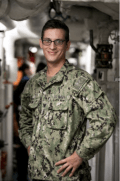 NORFOLK, Va. – A 2009 Clopton High School graduate and Bowling Green, Missouri, native is serving in the U.S. Navy aboard the guided-missile destroyer USS Mason.
NORFOLK, Va. – A 2009 Clopton High School graduate and Bowling Green, Missouri, native is serving in the U.S. Navy aboard the guided-missile destroyer USS Mason.
Navy Petty Officer 3rd Class Matthew Firkus is a fire controlman (aegis) aboard the warship, based in Norfolk, Virginia. USS Mason is named after Secretary of the Navy John Young Mason and Distinguished Flying Cross Recipient Ensign Newton Henry Mason.
A Navy fire controlman (aegis) is responsible for maintaining spy radars and fire control and weapons systems.
“All the equipment that I work with is a learning experience,” Firkus said. “I get to learn how one system interacts with another.”
Firkus credits success in the Navy to many of the lessons learned in Bowling Green.
“I built a strong work ethic working long hours back home,” Firkus said. “I worked at a prison which was stressful and this helps me deal with times of stress that I may encounter here.”
U.S. Navy sailors, like Firkus, are stationed both stateside and on the high seas aboard surface ships around the world. USS Mason is one of more than 60 ships on the east coast of the United States as part of Naval Surface Forces, U.S. Atlantic Fleet.
U.S. Navy ships are deployed globally, and their presence helps the Navy control the sea. Sea control is vital to project power, secure common areas, deter aggression and assure allies when and where desired.
Due to its extensive combat capability, the Mason is able to fire Tomahawk Cruise Missiles and other weapons as part of sustained combat operations against targets on and below the sea, in addition to hitting targets hundreds of miles over the land.
The ship is equipped with the Aegis Combat System, which integrates the ship’s electronic sensors and weapons systems to defend against anti-ship missile threats. The ship’s air search and fire control radar provides continuous search and tracking of hundreds targets simultaneously.
The crew of more than 300 sailors build a strong fellowship while working alongside each other. The sailors are highly motivated, and quickly adapt to changing conditions as part of a busy life of specialized work, watches and drills.
“I enjoy the educational benefits that the Navy has to offer and learning how systems here work with one another, it is a very rewarding experience,” Firkus said.
Though there are many ways for sailors to earn distinction in their command, community, and career, Firkus is most proud of graduating from his Navy technical school. It was very difficult and to get through it gave him a great sense of pride.
“A lot of sailors do not make it through the curriculum, and just being one of the people that did make it, is rewarding in itself,” Firkus said.
As a member of one of the U.S. Navy’s most relied upon assets, Firkus and other sailors know they are part of a legacy that will last beyond their lifetimes, one that will provide a critical component of the Navy the nation needs.
“Serving in the Navy means protecting the freedom of my country,” Firkus added. “It gives me a great sense of honor and pride knowing that I am doing my part.”